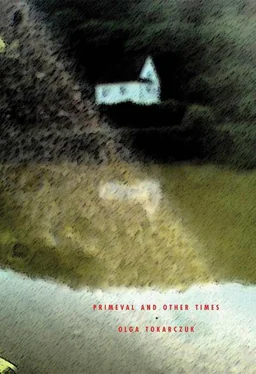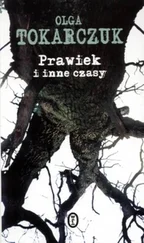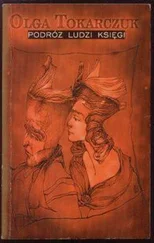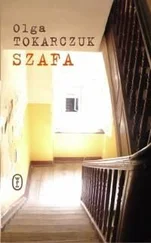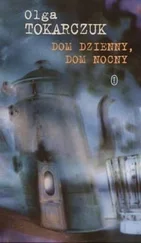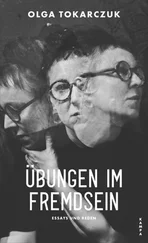And then, not without a sense of guilt, he saw Him in the frame of the skylight as a woman, She-God, or whatever She should be called. It brought him relief. He found it far easier to pray to Her than it had ever been before. He spoke to Her as to a mother. This went on for some time, but finally along with his prayers he started feeling a vague anxiety, which expressed itself by sending waves of heat through his body.
God was a woman, large, powerful, damp, and steaming like the earth in spring. She-God existed somewhere in space, like a storm cloud full of water. Her power was overwhelming, and reminded Izydor of some childhood experience that he feared. Every time he addressed Her, She answered him with a comment that gagged him. He couldn’t go on speaking, the prayer lost any thread it had, any intention. It was impossible to want anything from She-God, it was only possible to imbibe Her, breathe Her, or dissolve in Her.
One day, when Izydor was staring at his piece of sky, he had a revelation. He realised that God is neither a man nor a woman. He knew it as he uttered the words “O God.” Here lay the solution to the problem of God’s gender. By making it into one word, “Ogod,” it sounded neither masculine or feminine, but neutral, just like “oak tree,” “opal,” “ocean,” “odour,” “oatmeal,” “omen,” “open,”… Izydor excitedly repeated the real divine name that he had discovered, and every time he did, he knew more and more. So Ogod was young, and at the same time had existed since the beginning of the world or even earlier, without cease (because “Ogod” reminded him of “over and over”), it was unique and unrepeatable (“only”), and it was the start and finish of everything (“omega”), though if you tried to find it, it wasn’t there (“n-owhere”). Ogod was full of love and joy, but could also be cruel and dangerous. It contained all the features and attributes that are present in the world, and took on the form of every thing, every event, every time. It created and destroyed, or allowed what It created to destroy itself. It was unpredictable like a child, like someone insane. In a way It was a bit like Ivan Mukta. Ogod existed in such an obvious way that Izydor wondered how he could ever have failed to realise it.
This discovery brought him genuine relief. Whenever he thought about it, somewhere inside he felt a burst of laughter. Izydor’s soul was chuckling away. He stopped going to church, too, which met with Paweł’s approval.
“Though I don’t think they’d let you join the Party,” he said one day at breakfast, to dispel any hopes his brother-in-law might have.
“Paweł, you don’t have to chew porridge,” Misia pointed out to him.
Izydor couldn’t care less about either the Party or going to church. Now he needed time for thinking, remembering Ruta, for reading, for learning German, for writing letters, collecting stamps, staring at his skylight, and gradually, idly sensing the order of the universe.
Old Boski had built a house, but he hadn’t dug a well, and so Stasia Papuga had to go next door to her brother for water. She put a wooden yoke on her shoulders and attached buckets to it. As she walked along, the buckets creaked steadily.
Mrs Papuga drew water from the well and took a furtive look around the yard. She saw bedding hung out to air – the limp bodies of plump eiderdowns cast across poles. “I’d hate to have eiderdowns like that,” she thought. “They’re too warm and the feathers fall to the bottom. I prefer my nice light blankets with the linen covers.” Cold water spilled from the buckets onto her bare feet. “I wouldn’t like to have such large windows either. How much cleaning they must need! Or net curtains – you can’t see anything through them. I wouldn’t want that many children, and high-heeled shoes are bad for your feet.”
Misia must have heard the yoke creaking, because she came out onto the steps and invited Stasia inside. Stasia put the buckets down on the concrete and went into the Boskis’ kitchen, where it always smelled of burnt milk and dinner. She sat on a small table by the stove, never on a chair. Misia shooed away the children and ran under the stairs.
She always brought something useful out of there: trousers for Janek, a little sweater or some shoes Antek had grown out of. Stasia had to alter Misia’s hand-me-downs, because they were too small for her. But she liked sewing in bed when she woke up. So she added gores, gussets, and frills, and unstitched all the tucks.
Misia treated Stasia to Turkish coffee.
The coffee was well made and had a thick skin on which the sugar sat for a moment before sinking to the bottom. Stasia couldn’t take her eyes off Misia’s nimble fingers as she tipped coffee beans into the grinder and then turned the handle. Finally the grinder’s little drawer was full, and the aroma of freshly ground coffee floated about the kitchen. She liked the smell, but she found the actual coffee bitter and unpalatable. So she tipped a few spoonfuls of sugar into her glass until the sweetness overcame the bitterness. From the corner of her eye she watched the way Misia savoured the coffee, stirred it with her spoon, picked up the glass in two fingers and raised it to her lips. And then she did the same.
They talked about children, kitchen gardens and cooking. But there were times when Misia was inquisitive, too.
“How do you live without a man?”
“I’ve got Janek, haven’t I?”
“You know what I mean.”
Stasia didn’t know what to say. She stirred her coffee.
“Living without a man is bad,” she thought that evening in bed. Stasia’s breasts and belly wanted to cuddle up to a man’s body, solid and smelling of work in the sunshine. Stasia rolled up a pillow and hugged it as if it were another body, and fell asleep like that.
There were no shops in Primeval. All the shopping was done in Jeszkotle, and Stasia had an idea. She borrowed a hundred zlotys from Misia and bought several bottles of vodka and some chocolate. And then it just took off on its own. There was always someone needing a half litre in the evening. Sometimes on a Sunday someone felt like having a drink with a neighbour under a lime tree. The people from Primeval soon learned that Stasia Papuga had a bottle or two, and would sell it for not much more than in the shop. They would also buy some chocolate for the wife, so she wouldn’t be annoyed.
In this way Stasia got a business going. At first Paweł resented her for it, but then he started sending Witek to her for vodka himself.
“You know what the penalty for that is?” he asked her, frowning, but Stasia was sure that if, God forbid, something were to happen, her brother had acquaintances, and he wouldn’t let her come to harm.
She soon started going to Jeszkotle for goods two or three times a week. She also widened the range. She had baking powder and vanilla – things any housewife might suddenly run out of while doing the Saturday baking. She had various brands of cigarettes, oil and vinegar, and after a year when she bought herself a refrigerator, she started bringing home butter and margarine, too. She kept it all in the annex which, like everything, her father had built. There stood the refrigerator, and a couch on which Stasia slept, a tiled stove, a table, and some shelves behind a curtain of faded calico. Ever since Janek left to go to school in Silesia she hadn’t used the main room.
The illicit sale of alcohol, as Stasia’s business was called in official language, greatly enriched her social life. Various people came to see her, sometimes even from Jeszkotle and Wola. On Sunday mornings, hung-over forestry workers came on bicycles. Some bought whole half-litre bottles of vodka, others bought quarters, and others asked for a hundred grams on the spot. So Stasia would pour it for them and offer them pickled gherkins for free as a chaser.
Читать дальше
